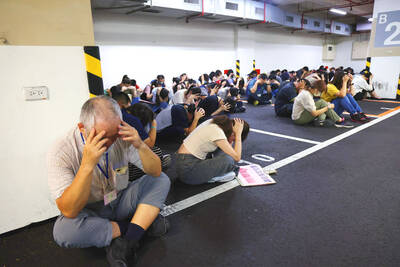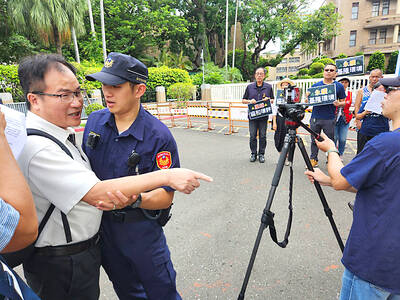Owners of drones will soon be able to check if they are in restricted areas by checking a new map provided by the Civil Aeronautics Administration (CAA).
CAA Deputy Director-General Fang Chih-wen (方志文) yesterday said that the new map would include some of the most recognizable landmarks or buildings close to or within restricted areas, adding that it would be available for use at the end of this month.
Drone owners would be able to see restricted areas nationwide on the new map, including the 17 civil aviation airports, Fang said.
“We have heard complaints from drone users, particularly those who have been penalized by us, that it was not easy to recognize some of the information displayed on the old map. As such, they could not be sure if they were operating in a restricted zone using the old map,” he said.
People would be able to download the new map from the CAA Web site, he said.
The new map would identify two types of restricted areas. One in which any flying object that could interfere with operations of flights is banned, the other were people are restricted from flying drones or other objects above 60m, Fang said.
The operation of drones inside or near airports causes a serious threat to aviation safety, Fang said, adding that four incidents have already occurred this year in which airports were forced to suspend the departure or landing of flights due to the intrusion of drones.
The administration has yet to locate the owner of the drone in any of those cases, he said.
Since 2014, the CAA has issued fines in 28 cases involving the illegal use of drones, with 17 of them occurring at Taipei International Airport (Songshan airport), Fang said.
People failing to follow the Civil Aviation Act (民用航空法) while they are operating drones face a fine of between NT$300,000 and NT$1.5 million (US$9,975 and US$49,875), he added.
The administration is in the process of drafting an amendment to the Civil Aviation Act that would enhance the management of the drones and their users, including exams that users have to pass in order to operate drones, he said.
Among some of the proposed changes, people owning drones weighing more than 250g would be required to register their drone, he added.
Drones that operate below 400 feet (122m) would be regulated by local governments, while those operating above 400 feet or around airports would be regulated by the CAA, he said.
Companies or legal entities that use drones for business purposes would be required to provide proof of public liability insurance, he said.
“We hope that the amendment will be submitted to the Legislative Yuan for deliberation during this legislative session,” Fang said.

Taipei on Thursday held urban resilience air raid drills, with residents in one of the exercises’ three “key verification zones” reporting little to no difference compared with previous years, despite government pledges of stricter enforcement. Formerly known as the Wanan exercise, the air raid drills, which concluded yesterday, are now part of the “Urban Resilience Exercise,” which also incorporates the Minan disaster prevention and rescue exercise. In Taipei, the designated key verification zones — where the government said more stringent measures would be enforced — were Songshan (松山), Zhongshan (中山) and Zhongzheng (中正) districts. Air raid sirens sounded at 1:30pm, signaling the

Environmental groups yesterday filed an appeal with the Executive Yuan, seeking to revoke the environmental impact assessment (EIA) conditionally approved in February for the Hsieh-ho Power Plant’s planned fourth liquefied natural gas (LNG) receiving station off the coast of Keelung. The appeal was filed jointly by the Protect Waimushan Seashore Action Group, the Wild at Heart Legal Defense Association and the Keelung City Taiwan Head Cultural Association, which together held a news conference outside the Executive Yuan in Taipei. Explaining the reasons for the appeal, Wang Hsing-chih (王醒之) of the Protect Waimushan Seashore Action Group said that the EIA failed to address

The number of people who reported a same-sex spouse on their income tax increased 1.5-fold from 2020 to 2023, while the overall proportion of taxpayers reporting a spouse decreased by 4.4 percent from 2014 to 2023, Ministry of Finance data showed yesterday. The number of people reporting a spouse on their income tax trended upward from 2014 to 2019, the Department of Statistics said. However, the number decreased in 2020 and 2021, likely due to a drop in marriages during the COVID-19 pandemic and the income of some households falling below the taxable threshold, it said. The number of spousal tax filings rebounded

A saleswoman, surnamed Chen (陳), earlier this month was handed an 18-month prison term for embezzling more than 2,000 pairs of shoes while working at a department store in Tainan. The Tainan District Court convicted Chen of embezzlement in a ruling on July 7, sentencing her to prison for illegally profiting NT$7.32 million (US$248,929) at the expense of her employer. Chen was also given the opportunity to reach a financial settlement, but she declined. Chen was responsible for the sales counter of Nike shoes at Tainan’s Shinkong Mitsukoshi Zhongshan branch, where she had been employed since October 2019. She had previously worked